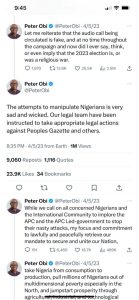Peter Obi, the presidential candidate of the Labour Party in the last election, is yet to file a lawsuit against People’s Gazette, the online media platform that broke the news of his controversial ‘Yes Daddy’ phone conversation with Bishop David Oyedepo exactly 100 days after threatening to do so.
The former Anambra governor, who faces renewed criticism over his recent support for the proscribed terror group IPOB, was heard in the phone conversation urging the cleric to help rally Christian voters to his side with inciting, divisive religious messages.
In the conversation, during which Obi repeated ‘yes daddy’ several times as a deferential response to the cleric; the candidate described the election as a ‘religious war’ while pleading with the cleric that his support was crucial in motivating Christians in key states of Kwara, Kogi, and Plateau, etc. to go to the polls as he failed to connect with voters there on important matters of governance.
The audio tape, which was obtained and first reported by the People’s Gazette, corroborated the accusations of critics that Peter Obi prosecuted the election as a “Christian-Igbo” candidate. His primary strategy was to exploit the country’s religious and ethnic fault-lines to claim an unearned victory, given his relative lack of popularity and limited political network when compared with the other two leading candidates.
Hoping to escape the criticism that followed the leak of the audio tape, Peter Obi published a statement on Twitter denying the conversation and threatening to institute legal proceedings against the People’s Gazette for its report on the subject. The statement was published on May 4, 2023, exactly 100 days from today.

However, he has not only failed to make good the threat, his campaign organization subsequently confirmed the authenticity of the tape. The other party in the conversation, Bishop David Oyedepo, also gave a tacit confirmation that the conversation truly took place although he demurred on the details, likely to avoid further criticism.
Recently, Senator Tony Nwoye of Anambra State also confirmed that support for Obi in the South East, his home region where he secured nearly 90% of the votes, was due primarily to ethnicity. In a television interview, he admitted that “we (Igbos) voted our brother and we have no regret about it.”
Obi’s self-constructed image as a “Christian-Igbo” politician has grown his alienation from other regions of Nigeria’s hugely diverse society. In the West and North, where Yoruba, Hausa, and Fulani enjoy a greater share of the population, Obi’s popularity continues to hit new lows as voters and residents increasingly view him as an ethnocentric figure with neither the detribalized mindset nor sensitivity required to preside over the country.
It also didn’t help matters that the election unearthed Obi’s long history of weaponizing social divisions to secure political advantage. Reports of how he instigated and deepened the Anglican-Catholic divide in Anambra State when he was governor have been exhumed and made known to the public. Also, his unyielding support for IPOB, the proscribed terror group calling for an independent Biafra nation of Igbos, also raises questions about his patriotism and commitment to the unity of the Nigerian state.

